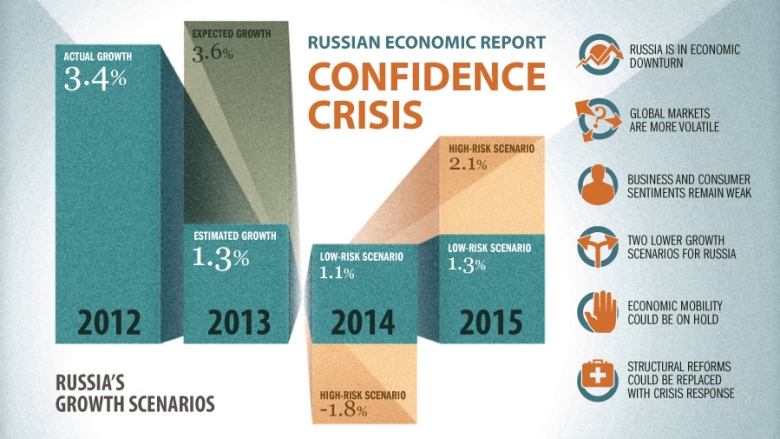“The Bank developed two lower growth scenarios for Russia. The outlook is highly dependent on a recovery in businesses’ and consumers’ confidence and how the geopolitical risks unfold,” said Birgit Hansl, World Bank Lead Economist and Country Sector Coordinator for Economic Policy in Russia and the main author of the Report. “The low-risk scenario assumes a limited and short-lived effect of the Crimea crisis and projects 1.1 percent growth for 2014 and 1.3 percent for 2015. The high-risk scenario assumes a more severe shock to economic and investment activities if the geopolitical situation worsens, resulting in a contraction of 1.8 percent in 2014 and 2.1 percent growth in 2015. Also, global risks are expected to remain prominent with continuing higher overall market volatility.”
In 2013, frail domestic demand was a drag on economic growth. Then anticipation that private investors would start investing more during the second half of 2013 did not materialize. The lack of growth-supporting structural reforms and decreasing profit margins weighed heavily on business sentiments and pushed down industrial and investment activities in Russia. Consumption remained the main growth driver, supported by fast credit and wage growth, but its pace of expansion more than halved compared to 2012.
“Structural reforms should be resumed to overcome the current confidence crisis and achieve the sustained long-term growth in Russia. To attract larger sustained private investments would require addressing the inefficiencies in factor allocation across the economy,” said Michal Rutkowski, World Bank Country Director for the Russian Federation. “It would also require creating a level playing field for innovative business by improving the quality of the regulatory and market institutions to help implement the rules evenly. “
Two policy conclusions emerge from the Report. First, the dearth of structural reform efforts is dampening Russia’s growth prospects. Second, no matter how the Crimea crisis unfolds, there is a risk that the Russian government will be put back into crisis mode in order to uphold macroeconomic stability, depending on the evolving scenario. It is likely that policy choices will be about managing short-term issues, and the medium-term agenda of structural reforms will continue to take a back seat.
The special focus section of the new Russian Economic Report looks at poverty reduction and middle-class formation in the country. The Bank’s research indicates that poverty-reduction and middle-class growth in Russia were explained by high growth in average incomes and consumption during the period of 2000-2010. The poverty rate fell down from 35 percent in 2001 to 10 percent in 2010. At the same time, the size of the middle class grew from 30 percent to 60 percent of the total population. However, weaker growth prospects and stabilizing consumption at a lower rate dim the economic mobility outlook. Economic factors, such as the wage growth and access to good, productive jobs, rather than the demographic factors drove the middle class growth in Russia. However, in the current environment of a much slower economic growth and constrained fiscal resources, job creation will be an important condition for the future economic mobility, as well as for strengthening the role of labor income as the main driver of the middle income growth.

